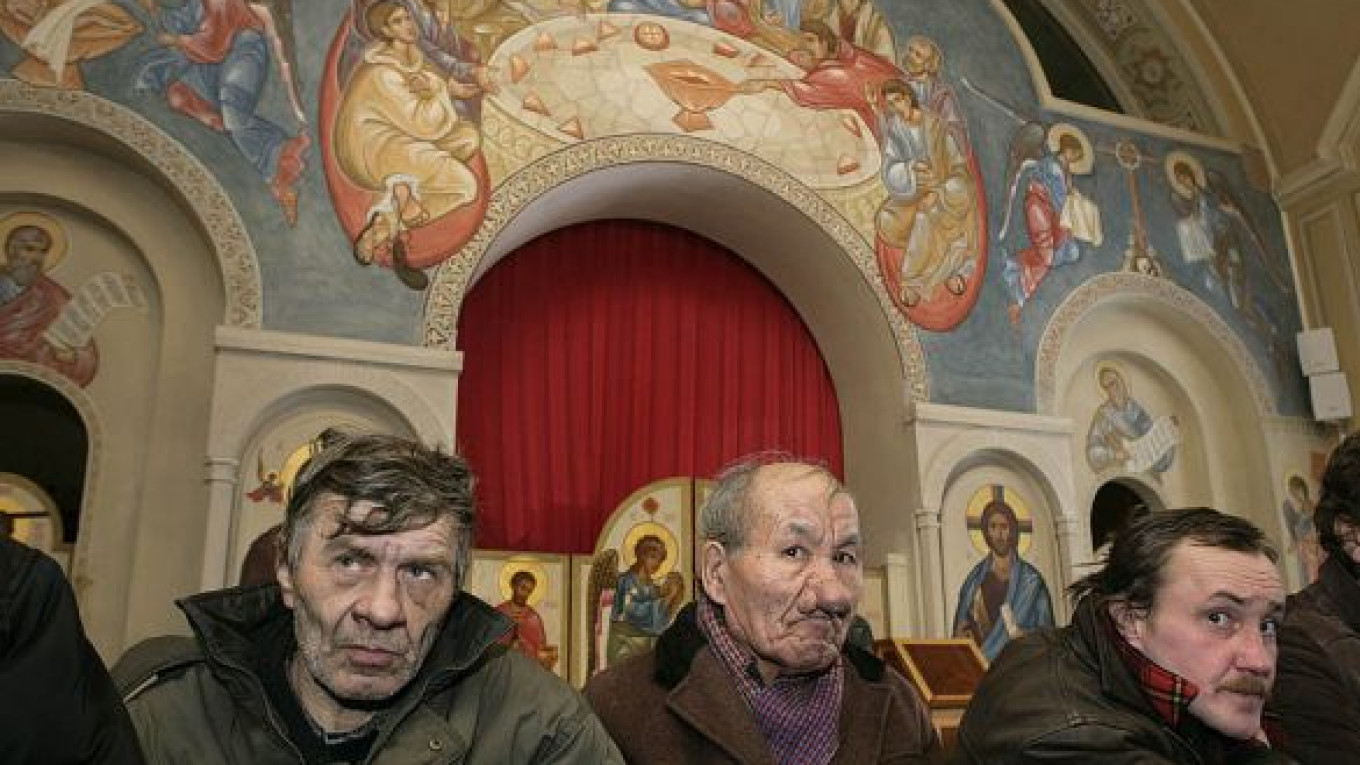A least one homeless person died and 33 others — including eight children — were hospitalized with hypothermia or frostbite in Moscow this week, City Hall's health care department Thursday.
In all, 24 people have frozen to death in Moscow's streets between November and late January, most of them homeless, Vladimir Petrosyan, head of City Hall's social protection department, Itar-Tass reported.
Conditions are expected to grow far more dangerous in the next week, as the Moscow weather bureau that temperatures will plunge as far as minus 24 degrees Celsius — hitting a low of minus 30 C on Sunday night.
But hypothermia deaths in Moscow have declined dramatically in recent years, with 32 having died last year compared with 1,223 in 2002, Noviye Izvestia Thursday, citing City Hall's social protection department.
Meanwhile, volunteers complained to city authorities at a round table this week of multiple problems in helping the homeless, including resistance from local police, financial shortfalls, excessive bureaucracy and the lack of resocialization programs.
On Thursday, representatives from City Hall, the Moscow police, the regional migration service, the children's ombudsman in Moscow and volunteer services gathered to try to better coordinate efforts to help the homeless.
Emil Sosinsky, co-founder of two shelters for the homeless in the Moscow region, told the group that local police were obstructing the shelters' work because they didn't want trouble from homeless people who had no passports or registration but had a criminal disposition and manifested anti-social behavior.
Fares Askerov, a Pentecostal cleric in Moscow, said volunteers with the church also encountered resistance from Moscow district police when feeding and proving medical aid in the street to hundreds of homeless.
Apart from police problems, Sosinsky said activists struggle to pay rent, get passports and registration for the homeless, train them to work and hire psychologists to help those with psychological problems.
The national census found that there were 6,432 adult homeless people in Moscow in 2010, Sergei Logunov, deputy head of City Hall's social protection department, told The Moscow Times following the round table.
Additionally, the number of homeless children registered in the city has declined from 9,130 in 2010 to 7,120 in 2011, said Natalia Lobodenko, a city police department head in the Central Administrative District.
Logunov said there are eight social adaptation centers for the homeless in Moscow, which can temporarily accommodate 1,477 homeless and help them get passports, job, medical and psychological assistance.
Two city-run stations provide hot meals for the homeless daily, he said.
Last year, the eight adaptation centers helped more than 6,000 homeless people, while City Hall's social patrol helped more than 13,500 homeless, Logunov said.
Migration officials issued identity papers for 1,415 homeless, including 204 passports, Sergei Shevyryov, deputy head of the Moscow branch of the Federal Migration Service, told the round table.
A Message from The Moscow Times:
Dear readers,
We are facing unprecedented challenges. Russia's Prosecutor General's Office has designated The Moscow Times as an "undesirable" organization, criminalizing our work and putting our staff at risk of prosecution. This follows our earlier unjust labeling as a "foreign agent."
These actions are direct attempts to silence independent journalism in Russia. The authorities claim our work "discredits the decisions of the Russian leadership." We see things differently: we strive to provide accurate, unbiased reporting on Russia.
We, the journalists of The Moscow Times, refuse to be silenced. But to continue our work, we need your help.
Your support, no matter how small, makes a world of difference. If you can, please support us monthly starting from just $2. It's quick to set up, and every contribution makes a significant impact.
By supporting The Moscow Times, you're defending open, independent journalism in the face of repression. Thank you for standing with us.
Remind me later.


